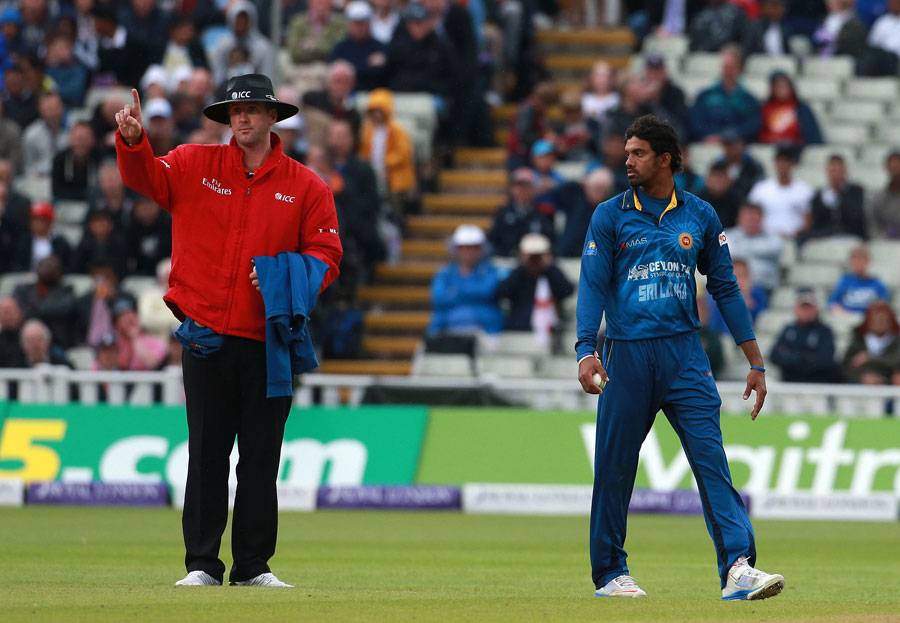Basil
Contributor
- Joined
- 6 Oct 2013
- Messages
- 4,888
- Reaction score
- 3,013
Senanayake catches Buttler dozing

There was little doubt what the Birmingham crowd thought to the run-out of Jos Buttler. Boos rang out around Edgbaston every time Sachithra Senanayake touched the ball following his decision to end Buttler's innings. Already utilising an action that some in England - a conservative country in cricketing terms - believe to be dubious, Senanayake will now forever be cast in the role of villain after running out the home side's golden boy in a rare instance of 'Mankading' in the international game.
Buttler, the non-striking batsman, had backed up too far. He was out of his crease. Senanayake, the bowler, had warned him in the previous over. He warned him, clearly and in sight of the umpires, that if Buttler continued to back up out of his crease, he would remove the bails and complete the run out.
After the incident, the umpires asked the Sri Lanka captain, Angelo Mathews, whether he wanted to withdraw the appeal. He confirmed that he did not and the umpires had no option. Buttler was clearly out. That left England 199 for 7 - they ended up making 219 in the deciding ODI of the series.
Such a dismissal is unusual, unpopular and creates a good deal of confusion. But it is not illegitimate and none of the umpires, Mathews or Senanayake deserve criticism. Indeed, you could argue that any other decision would have been illogical and, in an age where the game is on its guard against match-fixing, highly dubious. It might be compared to allowing a batsman a life after he had been stumped.
The confusion stems from the fact that the ICC playing conditions - effectively the rules under which international cricket takes place - differ from the Laws of the game as prescribed by the MCC. And, as a consequence, the rules that applied previously - the rules that most cricket lovers grew-up with - have also changed.
The MCC (Law 42.15) states that "The bowler is permitted, before entering his delivery stride, to attempt to run out the non-striker. Whether the attempt is successful or not, the ball shall not count as one of the over. If the bowler fails in an attempt to run out the non-striker, the umpire shall call and signal Dead ball as soon as possible."
But the ICC's playing regulation 42.11, which replaces Law 42.15 in international cricket, states: "The bowler is permitted, before releasing the ball and provided he has not completed his usual delivery swing, to attempt to run out the non-striker. Whether the attempt is successful or not, the ball shall not count as one of the over. If the bowler fails in an attempt to run out the non-striker, the umpire shall call and signal dead ball as soon as possible."
The crucial difference is that, while the MCC states the run out attempt must come before the bowler enters his delivery stride, the ICC allow it to come any time before the bowler completes his "delivery swing".
Nor is there, within the ICC playing regulations, any requirement to warn the batsman prior to the appeal. Senanayake was not only quite within his rights, he had actually offered Buttler an unnecessary courtesy. In a game where fine margins can decide results, Senanayake's decision to deny Buttler a few inches was simply pragmatic. He would have been a fool to do anything else.
England would be better served to look at their own faults rather than wallow in the indulgent belief that they have been wronged. It is irrelevant if Sri Lanka were reacting to news that Senanayake's action has been reported as suspect and it is irrelevant that Buttler was 'only' a little out of his ground: a line has to be drawn in these matters and, when it comes to a batsman being within his ground, that line is the crease. Buttler was guilty of some dozy cricket and should learn from the experience.
It should also be remembered that England were still shy of 200 at the time. Twice they had gone seven overs in their innings without hitting a boundary. They were already coming second in this game. Senanayake's intervention only played a minor part in their sub-par total.
Besides, Buttler should have known better. Not only was he warned but he experienced a similar incident in a county match between Surrey and Somerset in 2012 when his team-mate, Alex Barrow, was run out by Murali Kartik, who was then playing for Surrey as an overseas player.
You do wonder what Chris Adams thought, though. Adams, who was the Surrey coach at Taunton and is currently on the Sri Lanka staff as a consultant, described the incident as "regrettable" at the time.
It is also unusual. In an ODI at the Gabba in 2012, Virender Sehwag, the on-field captain for India at the time, withdrew an appeal after Ravi Ashwin ran out Lahiru Thirimane. While Sehwag's action may warrant praise, it might also be considered weak. He later explained it by suggesting he would have been criticised for any other decision.
Cricket needs to move on from the nebulous concept of 'gentlemanly' play and 'spirit.' It has playing conditions. It has Laws. It should stick with them and avoid being dragged into the mire that will be inevitable if it applies them sparingly.

